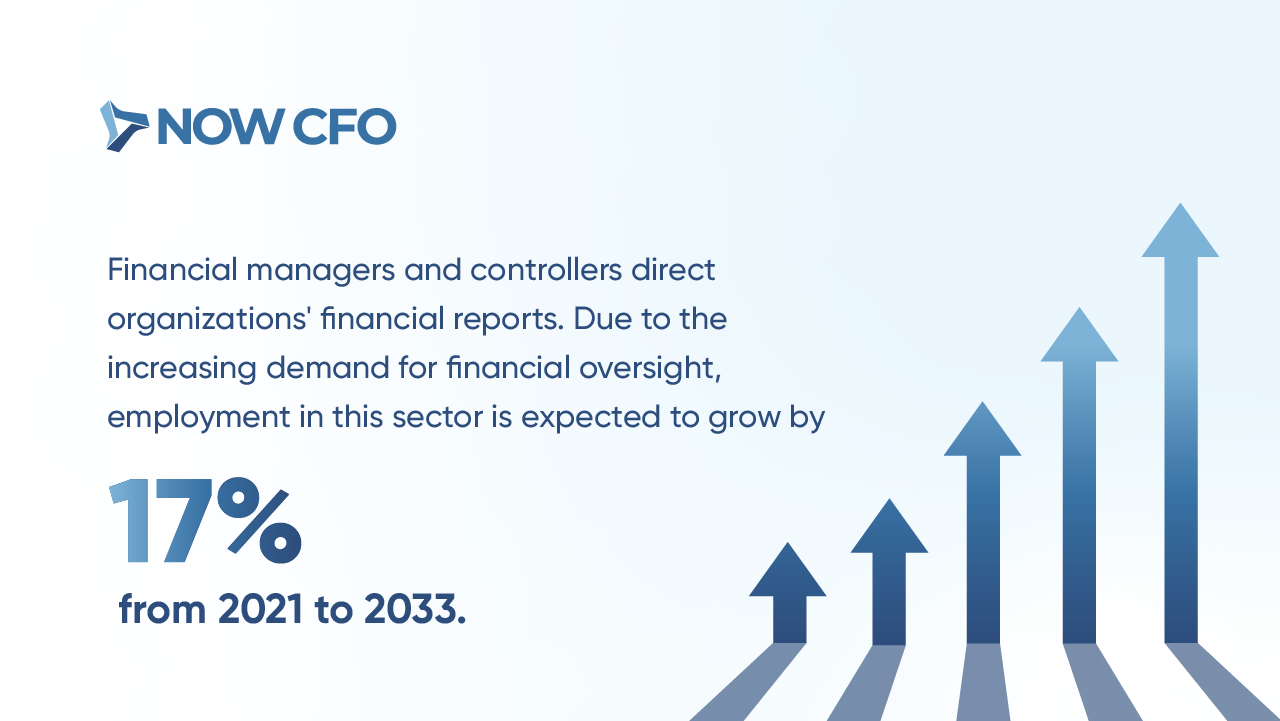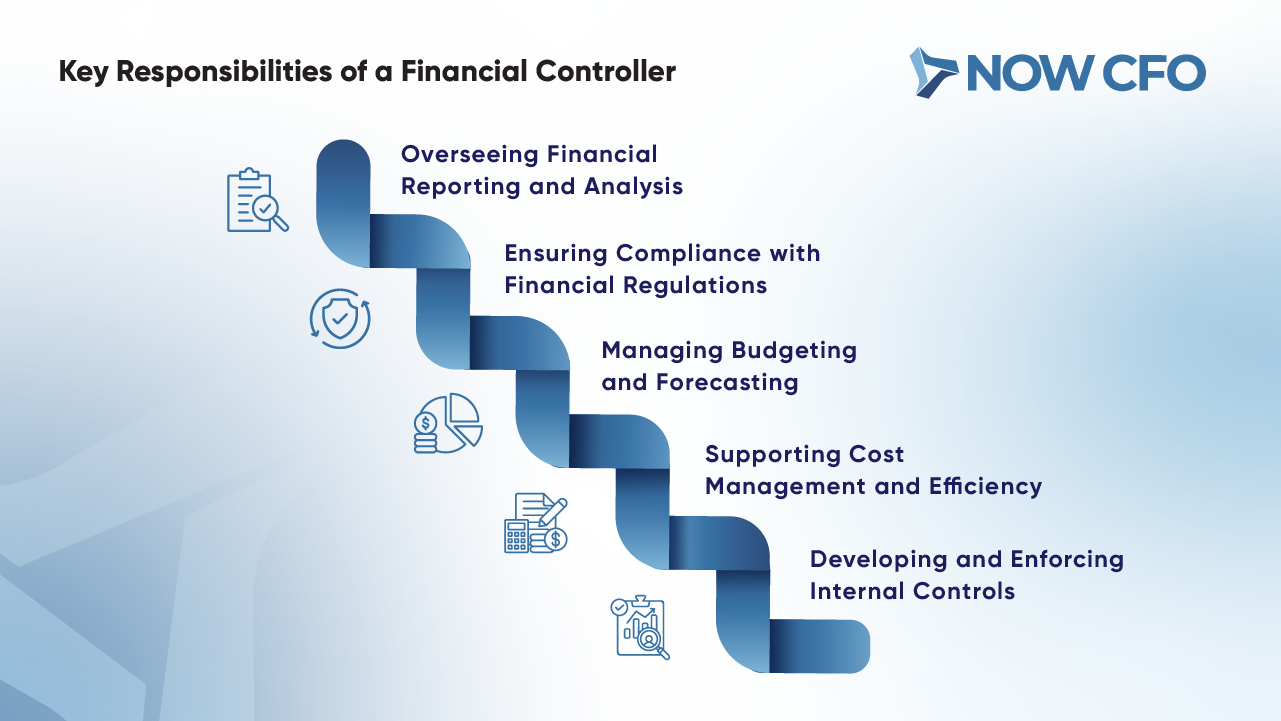The Role of a Controller in Your Business
Maintaining robust financial health is crucial in today’s competitive business landscape. However, many small businesses struggle with financial management, leading to significant challenges. Notably, 20% of small businesses fail within the first year, and 50% fail within five years, often due to lacking strategic financial planning.
A financial controller can be instrumental in steering your business toward success. By overseeing financial reporting, ensuring compliance, and aiding in strategic planning, a controller adds substantial value to your operations.
What Is a Financial Controller?
A financial controller serves as a senior-level executive responsible for overseeing an organization’s daily accounting operations and ensuring the accuracy of its financial records. Often referred to as the “company historian,” the controller maintains the integrity of economic data, which is crucial for informed decision-making.
Definition and Core Functions of a Controller
A financial controller acts as the lead accountant within a company, managing comprehensive financial activities to ensure accuracy and compliance. Their core functions include:
- Financial Reporting: Controllers oversee the preparation of financial statements, such as balance sheets, income statements, and cash flow statements. This responsibility ensures stakeholders understand the company’s financial health clearly and accurately.
- Budgeting and Forecasting: They develop and manage budgets and financial forecasts to guide the company’s financial planning and resource allocation. This process involves analyzing historical data and market trends to project future economic performance.
- Internal Controls: Implementing and monitoring internal controls is a key function to safeguard assets, ensure the accuracy of financial records, and prevent fraud. Adequate internal controls are vital for maintaining financial integrity and operational efficiency.
- Compliance Management: Controllers ensure the company adheres to financial regulations and accounting standards, reducing the risk of legal penalties and monetary misstatements. This includes staying updated with changes in laws and regulations that affect financial reporting and practices.
- Supervision of Accounting Staff: They lead and mentor the accounting team, ensuring that all financial transactions are recorded accurately and promptly. This leadership role is crucial for maintaining a competent and efficient accounting department.
Importance of Controllers in Financial Management
Financial controllers play a pivotal role in maintaining an organization’s financial stability and integrity. Their oversight ensures that economic data is accurate, timely, and compliant with regulatory standards, which is essential for strategic planning and operational decision-making.
Moreover, controllers provide critical insights through financial analysis, helping to identify trends, assess risks, and uncover opportunities for cost savings and revenue enhancement. Their expertise supports the organization’s strategic objectives and long-term financial health.
In addition to their traditional roles, financial controllers are increasingly involved in strategic planning and decision support. They collaborate with senior management to develop economic strategies that align with the company’s goals, contributing to informed decision-making and sustainable growth.
Furthermore, controllers’ implementation of robust internal controls helps prevent fraud and financial mismanagement, protecting the company’s assets and reputation. Their vigilance in compliance management ensures adherence to economic regulations, mitigating the risk of legal issues and monetary penalties.
Key Responsibilities of a Financial Controller
Financial controller responsibilities include playing a pivotal role in an organization’s economic health and overseeing various critical functions that ensure accuracy, compliance, and efficiency.

Financial managers and controllers direct organizations’ financial reports. Due to the increasing demand for financial oversight, employment in this sector is expected to grow by 17% from 2021 to 2033.

Overseeing Financial Reporting and Analysis
Financial reporting and analysis lie at the core of a financial controller’s role. They generate key financial statements, such as balance sheets, income statements, and cash flow reports. These documents serve as critical tools for understanding a company’s economic performance.
- Data Consolidation and Accuracy: Controllers collect, consolidate, and ensure the accuracy of financial data, which helps build reliable reports.
- Stakeholder Communication: Reports generated by controllers provide stakeholders, such as investors and executives, with essential insights for informed decision-making.
Moreover, financial analysis extends beyond basic reporting. Controllers identify trends and patterns within the data, offering recommendations for revenue growth and cost management.
Ensuring Compliance with Financial Regulations
Another critical duty of controllers is ensuring compliance with regulatory requirements. Financial regulations evolve frequently, making it imperative for organizations to stay updated.
- Adhering to Standards: Controllers enforce compliance with Generally Accepted Accounting Principles (GAAP) and International Financial Reporting Standards (IFRS), ensuring reports meet global standards.
- Monitoring Regulatory Updates: Controllers help mitigate risks by staying informed about changes in tax laws, audit rules, and other financial regulations.
- Collaboration with Auditors: Controllers often liaise with internal and external auditors to address discrepancies and ensure transparency.
Failure to comply with financial regulations can result in penalties and reputational damage. Controllers play a vital role in preventing these outcomes.
Managing Budgeting and Forecasting
Budgeting and forecasting are integral to financial planning and organizational success. Controllers oversee these activities to align resources with the company’s strategic goals.
- Budget Development: Collaborating with department heads and controllers to draft budgets that allocate funds effectively.
- Forecasting Future Performance: Controllers utilize historical data and market trends to create financial forecasts that predict revenue, expenses, and cash flow.
- Scenario Planning: They prepare contingency plans to address potential financial challenges, ensuring the organization remains resilient.
Supporting Cost Management and Efficiency
Cost management directly impacts an organization’s bottom line, and controllers are instrumental in optimizing efficiency. Their responsibilities include:
- Expense Monitoring: Controllers track and analyze department spending to identify waste areas.
- Cost-Saving Initiatives: By evaluating operations, they recommend strategies to minimize unnecessary expenses, such as renegotiating supplier contracts or adopting technological solutions.
- Performance Metrics: They establish KPIs to assess operational efficiency and align spending with business objectives.
Developing and Enforcing Internal Controls
Internal controls are fundamental to safeguarding an organization’s financial integrity. Controllers design and implement these mechanisms to prevent errors, fraud, and economic mismanagement.
- Risk Mitigation: Controllers identify areas of vulnerability within financial processes and establish safeguards.
- Policy Enforcement: They maintain operational consistency by enforcing explicit approvals, documentation, and reconciliations protocols.
- Periodic Audits: Regular internal audits conducted by controllers ensure compliance with established controls.
The Role of a Controller vs. CFO: Key Differences
Although “controller” and “CFO” are often used interchangeably, their roles differ significantly in focus and scope. Understanding these distinctions can help businesses allocate their financial leadership effectively.
Focus Areas and Responsibilities
Financial controller responsibilities include focusing on the internal workings of business financial management, while a CFO takes on a broader, strategic role.
Controller Responsibilities:
- Overseeing accounting functions, including financial reporting and compliance.
- Ensuring accurate financial records through audits and internal controls.
- Managing day-to-day financial operations, such as payroll and budgeting.
CFO Responsibilities:
- Developing financial strategies aligned with the company’s goals.
- Building relationships with investors and stakeholders to secure funding.
- Driving high-level decision-making related to mergers, acquisitions, and long-term growth.
Controllers ensure the financial engine runs smoothly, while CFOs chart the course for the organization’s economic future.
Strategic vs. Operational Financial Leadership
Controllers and CFOs play complementary roles, each emphasizing different aspects of financial management.
- Controllers: Primarily operational, they focus on the present. Their work revolves around maintaining financial integrity, optimizing processes, and ensuring regulatory financial compliance.
- CFOs: Highly strategic, they concentrate on the future. CFOs analyze market conditions, identify growth opportunities, and craft financial plans for long-term success.
Key Example: While a controller might prepare detailed cost analyses for current operations, a CFO would use that data to decide whether expanding into a new market is financially viable.
How Controllers and CFOs Collaborate
The synergy between controllers and CFOs is vital for effective business financial management.
- Data Sharing: Controllers provide CFOs with accurate financial data, enabling them to make informed strategic decisions.
- Compliance Support: Controllers ensure adherence to financial regulations, freeing CFOs to focus on big-picture planning.
- Joint Problem-Solving: Both roles collaborate on resolving financial challenges, such as improving cash flow or securing investment.
Example: During a merger, a controller ensures financial compliance with reporting requirements while the CFO negotiates terms and aligns the merger with the company’s strategic objectives.
How a Controller Adds Value to Your Business
A financial controller significantly influences a business’s success by ensuring effective financial management. Their work enhances transparency, drives efficiency, supports decision-making, and fosters growth. Here’s a detailed look at how they achieve these results.
Enhancing Financial Transparency and Accuracy
Controllers play a pivotal role in ensuring financial transparency. Accurate and transparent financial records give stakeholders a complete picture of the company’s financial health.
- Data Validation: Controllers meticulously verify data, ensuring that financial reports are error-free and reliable.
- Standardized Reporting: They implement uniform reporting standards to maintain consistency, making financial statements more straightforward to understand for both internal teams and external stakeholders.
- Compliance Assurance: Controllers enhance trust and credibility by adhering to accounting standards such as GAAP or IFRS.
Improving Operational Efficiency
Efficient financial operations can significantly enhance a company’s overall performance, and controllers excel in streamlining processes. Businesses that invest in financial process automation see up to a 70% increase in efficiency within two years.
- Automation of Routine Tasks: Controllers identify opportunities to automate repetitive accounting processes, such as payroll and invoicing. This reduces manual errors and saves time.
- Optimized Workflows: They assess existing workflows to identify inefficiencies and recommend adjustments, ensuring optimal resource allocation.
- Cost Reduction: By monitoring expenses closely, controllers help identify unnecessary costs and implement effective cost-saving measures.
Supporting Data-Driven Decision Making
A controller provides valuable insights that support informed decision-making. They analyze financial data to help leaders make strategic choices.
- Comprehensive Analysis: Controllers identify trends and patterns from historical data, offering actionable insights for future planning.
- Forecasting Tools: Advanced forecasting methods equip businesses to anticipate financial challenges and opportunities.
- Performance Metrics: Controllers develop key performance indicators (KPIs) tailored to the company’s goals, helping leaders monitor and adjust strategies.
Helping with Strategic Planning and Growth
Strategic planning requires a deep understanding of financial health, which controllers are uniquely positioned to provide.
- Growth Strategies: Controllers collaborate with executives to create financial strategies that support expansion, whether through investments, mergers, or acquisitions.
- Long-Term Planning: They assist in developing financial roadmaps that align with the company’s mission and goals.
- Risk Management: Controllers help identify financial risks and prepare mitigation strategies to safeguard long-term success.
When Should Your Business Consider Hiring a Controller?
Timing is crucial in deciding when to hire a financial controller. Understanding key signs and the associated benefits helps businesses make informed decisions about expanding their business financial management capabilities.
Signs Your Company Needs a Financial Controller
Recognizing the need for a controller often comes down to observing challenges in financial management.
- Inconsistent Financial Records: If your books frequently show discrepancies, it indicates a need for professional oversight.
- Complex Business Operations: Growing businesses often deal with intricate financial processes, making a controller essential to manage compliance, reporting, and cash flow.
- Leadership Time Constraints: A controller can take over day-to-day financial operations when CFOs or business owners spend too much time on accounting tasks instead of strategic planning.
Benefits for Small to Mid-Sized Businesses
Hiring a controller is often perceived as a resource reserved for large corporations, but small to mid-sized businesses can benefit significantly:
- Scalability: Controllers create financial systems that scale with growth, preparing businesses for expansion.
- Risk Mitigation: They implement strong internal controls, reducing the risk of fraud and mismanagement.
- Improved Decision-Making: With accurate financial data, controllers provide insights that empower leaders to make informed strategic decisions.
Controllers bridge the gap between day-to-day accounting and high-level financial strategy, enabling smaller businesses to operate like larger competitors.
Cost Considerations for Hiring a Controller
While the cost of hiring a controller may seem high initially, the long-term value they bring justifies the investment.
- Full-Time vs. Fractional Controllers: Businesses can choose between full-time controllers, which are ideal for large operations, and fractional controllers, which are more cost-effective for smaller businesses.
- Cost Offsets: Controllers help identify inefficiencies and reduce financial risks, often saving more than their salary in operational improvements and risk mitigation.
How to Choose the Right Controller for Your Business
Selecting the right financial controller is a critical decision that impacts your company’s financial health. By evaluating their skills, experience, and cultural fit, businesses can ensure they hire a candidate who aligns with their goals.
Key Skills and Qualifications to Look For
When hiring a controller, focus on their technical proficiency and leadership abilities.
- Accounting Expertise: Ensure candidates understand accounting principles, including GAAP or IFRS.
- Analytical Skills: Controllers must analyze financial data effectively to identify trends and provide actionable insights.
- Communication Abilities: Look for someone who can clearly explain financial concepts to non-financial stakeholders.
- Certifications: Credentials like CPA (Certified Public Accountant) or CMA (Certified Management Accountant) are indicators of expertise and dedication to the profession.
Industry Experience and Technical Expertise
A controller with relevant industry experience can quickly adapt to your business needs.
- Specialized Knowledge: Someone who understands the nuances of your industry can identify sector-specific challenges and opportunities. For instance, a controller familiar with retail might excel in managing inventory and supply chain costs.
- Technology Proficiency: Expertise in financial software such as QuickBooks, NetSuite, or ERP systems is essential for efficient operations.
Evaluating Cultural Fit and Leadership Skills
A controller must align with your organization’s culture and demonstrate strong leadership.
- Adaptability: Ensure the candidate can thrive in your company’s fast-paced or traditional environment.
- Team Leadership: Controllers often manage accounting teams, so they must inspire collaboration and efficiency.
- Problem-Solving Mindset: Look for candidates who can resolve financial challenges with innovative solutions.
Questions to Ask in the Hiring Process
Asking the right questions during interviews can help assess a controller’s suitability:
- How do you ensure accuracy and compliance in financial reporting?
- Can you share an example of a cost-saving initiative you implemented?
- What strategies do you use to manage a team under tight deadlines?
- Which financial software are you most proficient in?
- How have you handled regulatory challenges in past roles?
Conclusion: Maximizing Business Success with a Controller
Investing in a financial controller is a strategic move that can significantly enhance your company’s economic stability and growth prospects. The active role of a controller ensures accurate financial management and provides insights that drive informed decision-making.
If you’re ready to strengthen your financial foundation and propel your business forward, consider consulting with our team of experienced controllers. Contact NOW CFO, schedule a consultation, and discover how we can tailor our services to meet your business needs.



